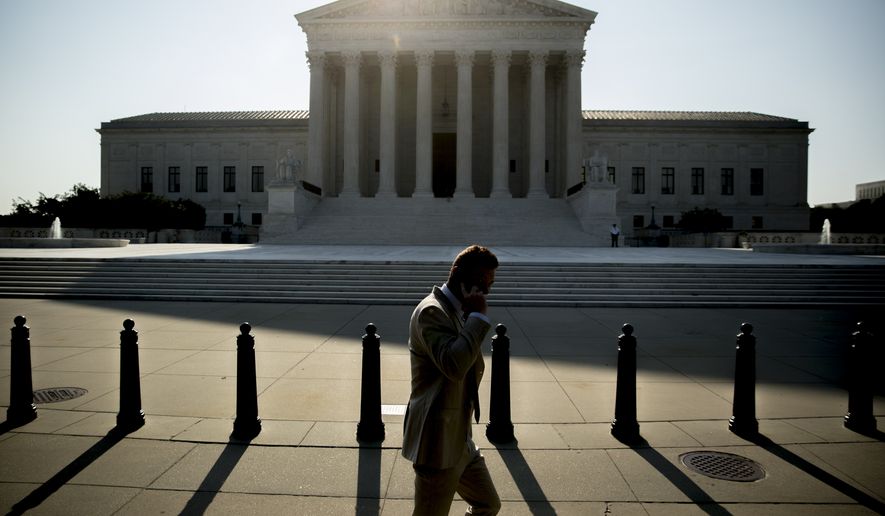The Supreme Court ruled Wednesday teachers at religious schools cannot bring workplace discrimination cases against their employers.
The 7-2 ruling said the lawsuits could not move forward because of the “ministerial exception” and court precedent, which has held that the First Amendment protects religious institutions from some workplace discrimination complaints.
“The religious education and formation of students is the very reason for the existence of most private religious schools,” said Justice Samuel Alito, writing for the majority, “and therefore the selection and supervision of the teachers upon whom the schools rely to do this work lie at the core of their mission.”
In Our Lady of Guadalupe v. Morrissey-Berru and St. James School v. Biel, the justices evaluated if courts can adjudicate these types of disputes after two teachers were fired from different Catholic elementary schools in California.
Kristen Biel said she was terminated due to age discrimination, while Agnes Morrissey-Berru said she was let go over her leave of absence for breast cancer treatment. (Justice Alito noted St. James School insists Ms. Biel was fired for poor performance in the classroom.)
The cases tested whether religious employers can freely select their ministerial employees, as the employees educated students according to the Catholic schools’ teachings, which involved regular religious lessons and quizzes on a range of doctrinal concepts, such as the seven sacraments or the Communion of Saints. Neither Ms. Biel, nor Ms. Morrissey-Berru, were officially called “minister” as was the case in the previous lawsuit before the court.
But Justice Alito said the title was irrelevant, noting “minister” wouldn’t apply to priests, nuns, rabbis and imams. Instead, he emphasized the employees’ importance to passing on religious education, even if the teacher themselves lacked formal religious training.
“Elementary school teachers often teach secular subjects in which they have little if any special training,” Justice Alito wrote.
Liberal Justices Elena Kagan and Stephen G. Breyer joined the court’s conservative justices in siding with the Catholic schools. In a concurring opinion joined by Justice Neil M. Gorsuch, Justice Clarence Thomas spelled out broad protections for religious institutions from the interference of courts under the First Amendment, invoking founding father James Madison, who decried the “arrogant pretension” of a civil magistrate imposing a religious truth test upon clergy.
“What qualifies as ’ministerial’ is an inherently theological question, and thus one that cannot be resolved by civil courts through legal analysis,” Justice Thomas wrote.
Religious-run education long precedes the formation of the U.S., tracing its roots to colonial days, observed the majority opinion. In 1647, the Massachusetts General Court passed the “Old Deluder Satan Act” requiring every sizable town to establish a school rooted in biblical values, Justice Alito wrote.
He also pointed out Wednesday’s opinion protecting a religious school’s independence from courts would ripple across various faiths, from Seventh-day Adventists to Judaism.
But critics of Wednesday’s ruling decried nearly unimpeachable authority by religious employers to discriminate against employees. Justice Sonia Sotomayor dissented, joined by Justice Ruth Bader Ginsburg, that the teachers were fired because “one had breast cancer and the other was elderly.”
“In the Court’s view, because the employees taught short religion modules at Catholic elementary schools, they were ’ministers’ of the Catholic faith and thus could be fire any reason, whether religious or nonreligious, benign or bigoted, without legal recourse,” Justice Sotomayor wrote.
Wednesday’s decision comes just weeks after the Supreme Court stunned many religious liberty observers by declaring it illegal under federal employment law to fire an employee for being gay or transgender. Justice Alito’s opinion, joined by six colleagues, appears to reassert the trajectory of Chief Justice John G. Roberts Jr.’s court, which has typically been friendly to religious liberty causes.
“We applaud the Supreme Court for recognizing that the Constitution bars the government from interfering in the independent employment decisions of religious organizations,” said Kelly Shackelford, president of First Liberty Institute. “There should no longer be any doubt that religious schools and institutions have the right to freely choose who will preach their religious message, teach their religious doctrine, and lead our future generations according to their religious tradition.”
The Americans United for Separation of Church and State said Wednesday’s decision twists religion from “what is meant to be a shield that protects us into a sword to harm others.”
“The ministerial exception is meant to apply only to genuine faith leaders,” AUSCS President Rachel Laser said. “It should not be exploited to justify discrimination against math, gym, and computer teachers, who clearly aren’t ministers.”
Neither of the Catholic school teachers in Wednesday’s decision had religious education training and, as Justice Alito noted, the positions could’ve potentially been filled by non-Catholics. However, employment of the teachers also needed to be approved by the diocese, and each teacher worshipped, prayed and attended Mass with their students.
Wednesday’s decision appears to be a potentially fatal setback for another closely watched lawsuit involving former two former guidance counselors in Indiana who sued a Catholic high school and the Indianapolis Archdiocese over employment discrimination over their same-sex marriages.
• Alex Swoyer can be reached at aswoyer@washingtontimes.com.
• Christopher Vondracek can be reached at cvondracek@washingtontimes.com.




Please read our comment policy before commenting.